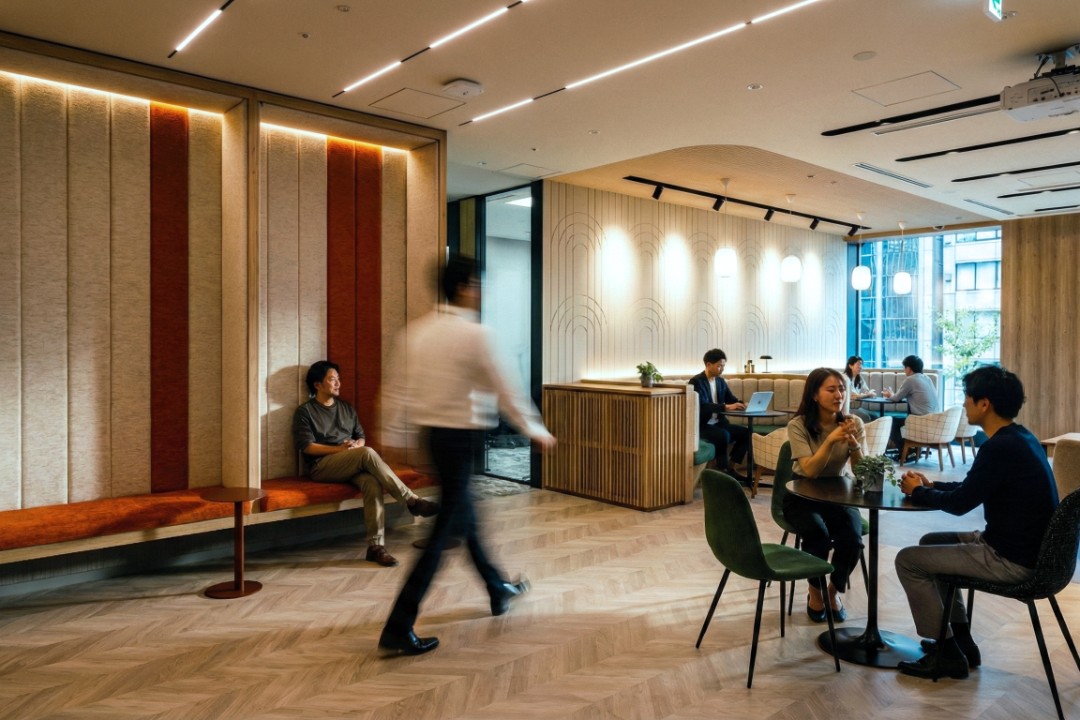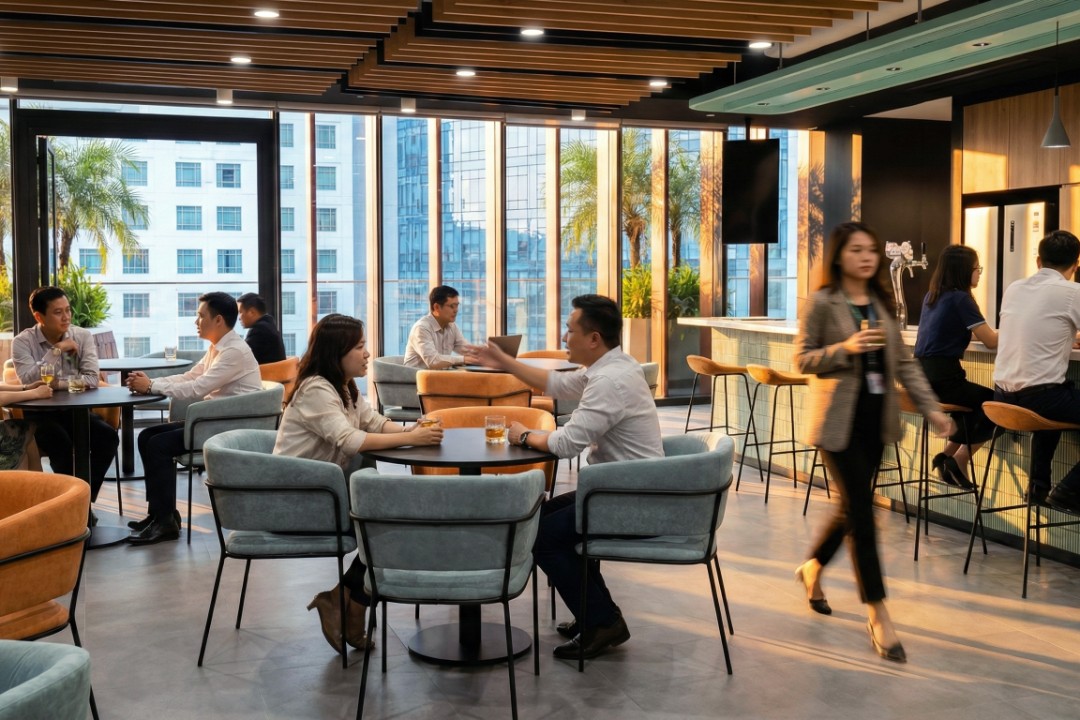在日本經營業務,為何實體辦公室不可或缺?

日本擁有穩定的經濟環境與創新市場,對外國企業而言潛力無限。不過,若要在當地商業環境中站穩陣腳,便需要了解日本獨特的商業文化。放眼全球,遠端工作逐漸普及,從2020年起,在辦公室以外工作的員工比例由20%上升至2023年的28%,企業的營運方式、溝通與協作模式亦隨之改變。
然而,日本依然堅守傳統的商業禮儀,極重視面對面的交流。擁有一個實體辦公室,不單是對業務的承諾與穩定性的展現,更是一種長遠經營的表態。在當地建立實體據點,有助於鞏固業務關係、符合法規要求,亦能為品牌打造專業形象,具備實際及戰略上的重要性。
日本商業文化對實體辦公室的影響
日本商業文化重視禮節與階級制度,親身互動,例如交換名片(名刺交換)及參與正式會議,被視為不可或缺。長幼有序是職場基本,年資較高者常獲更高敬意,而這些尊重往往透過親身出席及對細節的講究展現。「面子文化」亦深植於人際互動當中,講求體面與謙遜。
在這種文化背景下,設立實體辦公室代表你對合作關係的重視與誠意。例如,許多日本高層在簽署重大合約前,會親身造訪辦公室,視之為信任的象徵。透過實際投入人力和資源,表現出對日本商業文化的尊重,大大提升合作機會與夥伴信任。
此外,品牌形象與信任感亦密不可分。辦公室若設於知名商業區或優質大廈,能彰顯企業的專業度、財務穩定性與長遠眼光。對潛在客戶及合作夥伴來說,看到高質感的辦公空間、便利的位置與舒適的接待區,會自然提升對品牌的認同與信賴。
日本的辦公室類型
在日本,企業可選擇傳統私人辦公室、現代共用辦公空間(包括固定桌位或流動桌位)以至結合兩者優勢的混合辦公模式。
- 私人辦公室:傳統封閉式空間,重視私隱、階級及專業感,適合正式會議與體現日本尊重組織架構的價值觀。
- 服務式辦公室:設施齊全、可即時進駐,靈活彈性高,尤其適合希望快速進入日本市場的初創企業,這類辦公室通常位於核心商業地段,對僱員及客戶而言皆便利。
- 共用辦公空間:開放式設計,便於人脈拓展,現代化風格及完善設施深受科技及創新公司歡迎。
- 虛擬辦公室:具成本效益,提供公司地址、行政支援及郵件處理服務,毋須實際工作空間。
- 混合辦公空間:結合私人辦公室與共用空間的優點,讓企業可靈活應對人手變化,節省成本並保持運作彈性。
實體辦公室在日本法律與簽證申請中的角色
在日本擁有一個實體辦公室不僅有助合法合規,更可提升企業公信力。外籍創業者申請「經營管理簽證」時,必須擁有實體、可上鎖的辦公空間,虛擬辦公室並不符合移民規定。
此外,實體地址是開設銀行帳戶、處理政府文件及報稅的基本條件。雖然虛擬辦公室較便宜,但無法滿足這些法規要求,亦缺乏實體會議空間、合作夥伴的信任,以及移民法上的合法性。
辦公室設計如何提升員工生產力?
投資辦公室設計不僅關乎外觀,更直接影響員工的士氣、創意與持續工作效率。根據法政大學一項研究,辦公環境質素如空氣質素、照明、聲學與空間佈局,與員工的工作效率、舒適度及整體滿意度有明顯關聯。
例如照明不足或通風欠佳,容易影響表現,甚至加劇「出勤卻低效」這類日本職場常見問題。相反,舒適宜人的工作環境能吸引優秀人才、減少員工流失,進一步增強企業的競爭力及可持續發展能力。
租用日本辦公室的成本與注意事項
在日本租辦公室有一套獨特的做法,了解當中細節有助企業掌握成本、避免意外開支。其中一個特色是「禮金」,即支付給業主、不可退還的「心意金」,一般為1至2個月租金。
另一常見費用是「押金」,通常相當於數個月租金,理論上可於租約完結後退還,惟需扣除清潔或損壞費用。部分業主亦會收取「保證金」,視乎合約條款而定。
企業亦需預留日常支出如管理費、續租費(更新料)等。合約往往要求租戶於退租時將空間恢復至原狀,可能導致高昂的裝修費。因此,建議於簽約初期清晰談妥條款,減低長遠成本與風險。
選擇日本辦公室地點時應考慮的因素
在日本選址開設辦公室時,需綜合考慮多項因素。交通便利極為重要,尤其鄰近地鐵或火車站的位置更具吸引力,因鐵路是日本城市主要通勤方式。
辦公室地區的聲譽亦是關鍵。以東京為例,澀谷、 新宿等地適合科技型企業,丸之內則是傳統商業中心,地位顯赫。
若能選址於行業聚集地或客戶群附近,不但能提升品牌曝光度,亦有助營運效率。對於有發展潛力的初創企業,選擇可配合未來發展的地點,亦能讓潛在合作夥伴感受到誠意與長遠規劃。
準備在日本市場開拓您的業務版圖了嗎?
在日本設立實體辦公室是建立信任、符合法規並提升品牌形象的重要一步。如果您希望順利融入當地商業環境並打造穩固的合作關係,現在就與我們聯繫吧。我們的專業團隊將為您提供全面的指導,從選址到合規,確保您的辦公空間能助力業務蓬勃發展。不要錯過在日本市場成功的機會——立即採取行動!


